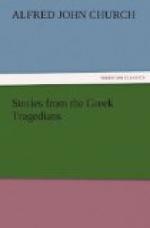Then the King made reply, “I tremble not at any man’s adorning, and a device woundeth not. And, indeed, as for the night that thou tellest to be on his shield, haply it signifieth the night of death that shall fall upon his eyes. Over against him will I set the son of Astacus, a brave man and a modest. Also he is of the race of the Dragon’s Teeth, and men call him Melanippus.”
And the messenger said, “Heaven send him good fortune! At the gate of Electra standeth Capaneus, a man of great stature, and his boastings are above all measure, for he crieth out that he will destroy this city whether the Gods will or no, and that Zeus with his thunder shall not stay him, for that the thunder is but as the sun at noon. And on his shield he hath a man bearing a torch, and these words, ’I will burn this city.’ Who now shall stand against this boaster and fear not?”
Then the King said, “His boastings I heed not. They shall turn to his own destruction. For as he sendeth out swelling words against Zeus, so shall Zeus send against him the thunder, smiting him, but not of a truth as the sun smiteth. Him shall Polyphantus encounter, a valiant man and dear to Queen Artemis.”
“He that is set against the gate of Neis is called Eteoclus by name. He driveth a chariot with four horses, in whose nostrils are pipes making a whistling noise, after the fashion of barbarians. And on his shield he hath this device: a man mounting a ladder that is set against a tower upon a wall, and with it these words, ‘not Ares’ self shall drive me hence.’ See that thou set a fit warrior against him.”
“Megareus, son of Creon, of the race of the Dragon, shall fight against him, who will not leave the gate for any whistling noise of horses; for either he will die as a brave man dieth for his country, or will take a double spoil, even this boaster and him also that he beareth upon his shield.”
“At the next gate to this, even the gate of Athene, standeth Hippomedon. A great shield and a terrible he hath, and on it this device, which no mean workman hath wrought: Typhon breathing out a great blast of black smoke, and all about it serpents twined together. And the man also is terrible as his shield, and seemeth to be inspired of Ares. Whom wilt thou set against this man, O King?”
“First shall Pallas stand against him and drive him from this city, even as a bird driveth a snake from her young ones. And next I have set Hyperbius, son of Oeneus, to encounter him, being inferior neither in form nor courage, nor yet in skill of arms, and also dear to Hermes. Enemies shall they be, bearing also on their shields gods that are enemies, for Hippomedon hath Typhon, but Hyperbius hath Zeus; and even as Zeus prevailed over Typhon, so also shall Hyperbius prevail over this man.”
“So be it, O King. Know also that at the north gate is set Parthenopaeus the Arcadian. Very young is he, and fair also to behold, and his mother was the huntress Atalanta. This man sweareth by his spear, which he holdeth to be better than all gods whatsoever, that he will lay waste this city. And on his shield he beareth a device, the Sphinx, which holdeth in her claws one of the sons of Cadmus.”




